The latest data from the China Association of Automobile Manufacturers (CAAM) paints a grim picture for China’s auto market, with a significant 27% plunge in February vehicle sales, amounting to 1.2 million units. This sharp decline is largely attributed to reduced production during the Spring Festival. This setback underscores the challenges faced by the world’s largest auto market, hinting at broader economic implications.
Turning to industry news, Group 1 Automotive, Inc. (GPI) continues its acquisition spree, expanding its portfolio by acquiring Modern Classic Motors. Across another corner, U.S. automaker Ford (F) has agreed to a hefty $365 million settlement to resolve a decade-long dispute over federal tariff law violations. In a bid towards sustainable transportation, Westport Fuel Systems (WPRT) joined forces with Volvo Group to drive cleaner mobility solutions. Meanwhile, Toyota (TM) made headlines by accepting significant wage increases demanded by the union, marking a substantial hike after 25 years. On automation frontiers, Mercedes-Benz Group MBGAF paired with Apptronik to deploy humanoid robots in its factories, aiming to enhance efficiency and address labor shortages.
Recent Acquisitions and Legal Wrangles
In the latest corporate moves, Group 1 Automotive solidified its presence by acquiring Modern Classic Motors, expanding its partnership with established brands like Mercedes-Benz and Honda. On the legal front, Ford’s $365 million settlement showcases the repercussions of a prolonged tariff law dispute, underscoring the importance of regulatory compliance and ethical conduct in the auto sector.
Advancements in Sustainable Transportation
Westport Fuel Systems’ collaboration with Volvo Group signifies a collective commitment towards sustainable mobility solutions. The joint venture aims to leverage innovative fuel system technology, emphasizing a strategic alliance to combat carbon emissions across industries. This move reflects a broader shift towards environmentally conscious practices in the transportation sector.
Union Negotiations and Automation Initiatives
Toyota’s accord with the union not only marks a milestone in wage negotiations but also sets a precedent for industry standards, impacting millions of employees and signaling economic trends. Meanwhile, Mercedes-Benz’s foray into robotic automation with Apptronik heralds a new era of manufacturing efficiency, tackling workforce shortages while optimizing production processes. These advancements hint at a transformative phase within the automotive landscape, blending human expertise with robotic assistance.
Exploring Price Trends and Future Prospects
Examining the price movements of key players in the auto industry provides valuable insights into market dynamics. Investors eagerly await forthcoming data releases and quarterly results, anticipating shifts in consumer behavior and corporate performance. The road ahead promises to be laden with challenges and opportunities, as industry players navigate through evolving trends and regulatory landscapes.
Key Insights and Industry Trends
As the auto industry grapples with unprecedented challenges, from regulatory compliance to workforce shortages, collaborations and legal resolutions play a pivotal role in shaping the sector’s trajectory. Sustainable practices, wage negotiations, and automation initiatives highlight the industry’s resilience and adaptability in a dynamic market environment. Investors and stakeholders keenly observe these developments, seeking cues for future investment strategies and business operations.





